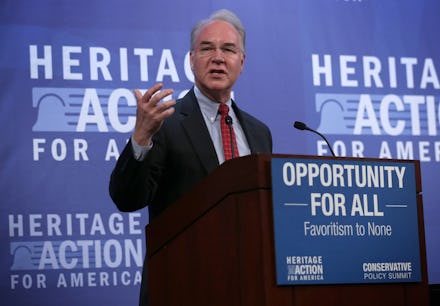Tom Price, Trump's pick for health secretary, is a troubling sign for reproductive rights

Rep. Tom Price, President-elect Donald Trump's selection to head the Department of Health and Human Services, has spent much of his political career pursuing initiatives that would, in his view, improve the American health care system. Apparently, that means making women's health care much, much more difficult to get and eliminating access to abortion.
The congressman has a lengthy record of opposing abortion access, reproductive rights and civil rights for women and LGBTQ people at every turn. He promises to bring those attitudes with him to the nation's top health agency, where he'll be responsible for overseeing government health programs including Medicare and Medicaid, as well as the Food and Drug Administration, the Centers for Disease Control and Prevention, and the National Institutes of Health.
A former orthopedic surgeon, Price has spent the last several years in Congress as a leading opponent of the Affordable Care Act, and has proposed an alternative to the health care law. Those alternatives, however, reflect the staunch conservative's opposition to reproductive health services. They could exclude some of the key components of the ACA, such as the contraceptive coverage mandate, that have made basic health care more accessible to millions of Americans. Ultimately, that would make it more difficult for people with low incomes to get the medical care they need.
"Price has voted for extreme bans on abortion care and coverage and vowed to end Obamacare," Destiny Lopez, co-director of All Above All, said in a statement to Mic. "This nomination is yet another signal that Trump plans to make good on his promise to repeal Obamacare, defund Planned Parenthood, and punish women who have abortions by making the Hyde Amendment permanent. Trump has no mandate to take away women's basic rights and we plan to fight these heinous proposals every step of the way."
His appointment could be a sign of just how serious Trump is about repealing Obamacare, but it also indicates something else: Women's health and well-being likely won't be of much concern to the incoming administration. Where the president-elect has spoken in vague terms about his policy plans for limiting people's access to reproductive health care, Price has a legislative history that proves he's intent on dismantling reproductive rights — and that he knows how to do it.
Since he took office in 2005, Price has voted against any and all federal funding for abortion, including Title X family planning funding to organizations that provide abortions. He has challenged ACA's contraceptive coverage mandate as a violation of religious freedom, and claimed, in 2012, that "there's not one" American woman who can't afford to pay for birth control. The congressman has certainly earned his 100% rating from the National Right to Life Committee (and corresponding 0% rating from Planned Parenthood, an organization he has voted to defund).
There are plenty of laws related to reproductive health Price has favored, however — and all of them are meant to decimate access to abortion and family planning tools that could prevent pregnancy. In addition to favoring measures that would reduce minors' ability to reach abortion providers and limit physicians' ability to perform the procedure, the congressman also co-sponsored a bill to grant developing fetuses — or "preborn human persons" — equal protection under the 14th Amendment, widely seen by pro-abortion rights advocates as an infringement on pregnant people's rights.
The latter move hints at the more sexist and homophobic undertones of Price's voting record, and provides a clear and devastating picture of what his leadership of HHS could mean for millions of marginalized people in the U.S.
Price is also an outspoken opponent of LGBTQ rights who is likely to gut the ACA's nondiscrimination provision. He has proven to be a tireless foe of civil rights protections, whether for people of color, queer people or women. He has voted against equal pay legislation, same-sex marriage, prohibiting job discrimination on the basis of sexual orientation, affirmative action and reauthorization of the Violence Against Women Act.
But perhaps worst of all, he's shown no signs of rethinking any of those positions in the face of his potential new role, where his primary job will be overseeing the welfare of all residents of the United States.